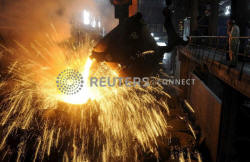|
The
country will also step up monitoring and analysis of commodity
prices such as crude oil, natural gas and soybean, the National
Development and Reform Commission (NDRC) said in a statement.
"(Local governments) should study and judge the import impact in
depth, promptly make suggestions... (on matters) such as
reserves, import and export, fiscal and taxation, and financial
adjustment measures," the statement said.
The NDRC also said authorities would "reasonably adjust cotton
target price levels" and stick to the country's minimum purchase
price policy framework for rice and wheat, it said. The
government buys these grains from farmers at a minimum price
when the market drops below that level.
The move comes as Beijing prioritises guaranteeing food security
for its population of 1.4 billion.
The NDRC said it will build a solid grain supply and stabilise
prices.
In energy markets, the state planner said China will adopt a new
pricing mechanism for pumped storage, and promote price reforms
in transmission and distribution of electricity, in order to
improve flexibility in the grid system.
"For high-energy intensity and high-emission industries, (China)
will implement differential and tiered electricity prices... to
promote carbon reduction," the statement said.
Commodities prices in the world's second biggest economy have
seen big swings this year driven by post-pandemic demand
recovery, global liquidity easing and speculative trading.
Beijing's recent moves come after soaring metals prices
contributed to a spike in factory gate prices and slower growth
in industrial output in April.
Government watchdogs have repeatedly urged industrial metal
firms to maintain market order, pledged tougher inspections on
physical and derivative markets and probes into behaviour that
bid up prices.
Futures prices for commodities such as iron ore and corn on the
Dalian Commodity Exchange, steel and copper on the Shanghai
Futures Exchange all hit historic highs this year.
Premier Li Keqiang also said on Monday that the government will
strive to prevent rising commodity prices being passed on to
consumers. (https://bit.ly/3bRYvjc)
(Reporting by Min Zhang, Hallie Gu, Muyu Xu and Shivani Singh;
editing by Clarence Fernandez and Jason Neely)
[© 2021 Thomson Reuters. All rights
reserved.] Copyright 2021 Reuters. All rights reserved. This material may not be published,
broadcast, rewritten or redistributed.
Thompson Reuters is solely responsible for this content.

|
|





